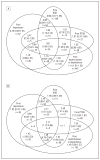Cognitive ability in early adulthood and risk of 5 specific psychiatric disorders in middle age: the Vietnam experience study
- PMID: 19047528
- PMCID: PMC3634571
- DOI: 10.1001/archpsyc.65.12.1410
Cognitive ability in early adulthood and risk of 5 specific psychiatric disorders in middle age: the Vietnam experience study
Abstract
Context: Lower cognitive ability is a risk factor for some forms of psychopathology, but much of the evidence for risk is based on individuals who required specialist care. It is unclear whether lower ability influences the risk of particular patterns of comorbidity.
Objective: To examine the relation between premorbid cognitive ability in early adulthood and the risk of major depression, generalized anxiety disorder (GAD), posttraumatic stress disorder (PTSD), alcohol and other drug abuse or dependence, and comorbid forms of these conditions in midlife.
Design: Prospective cohort study in which cognitive ability was measured on enlistment into military service at a mean age of 20.4 years and psychiatric disorder was assessed by structured diagnostic interview at a mean age of 38.3 years.
Setting: The United States.
Participants: A total of 3258 male veterans, participants in the Vietnam Experience Study.
Main outcome measures: Major depression, GAD, PTSD, and alcohol or other drug abuse or dependence since enlistment and currently, diagnosed according to the DSM-III.
Results: Lower cognitive ability was associated with an increased risk of depression, GAD, alcohol abuse or dependence, and PTSD and with some patterns of comorbidity. For a 1-SD decrease in cognitive ability, unadjusted odds ratios (95% confidence interval) for having these disorders currently were 1.32 (1.12-1.56) for depression, 1.43 (1.27-1.64) for GAD, 1.20 (1.08-1.35) for alcohol abuse or dependence, 1.39 (1.18-1.67) for PTSD, 2.50 (1.41-4.55) for PTSD plus GAD, 2.17 (1.47-3.22) for PTSD plus GAD plus depression, and 2.77 (1.12-6.66) for all 4 disorders. Most associations remained statistically significant after adjustment for confounders.
Conclusions: Lower cognitive ability is a risk factor for several specific psychiatric disorders, including some forms of comorbidity. Understanding the mechanisms whereby ability is linked to individual patterns of psychopathology may inform intervention.
Figures

References
-
- David AS, Malmberg A, Brandt L, Allebeck P, Lewis G. IQ and risk for schizophrenia: a population-based cohort study. Psychol Med. 1997;27(6):1311–1323. - PubMed
-
- Gunnell D, Harrison G, Rasmussen F, Fouskakis D, Tynelius P. Associations between premorbid intellectual performance, early-life exposures and early-onset schizophrenia: cohort study. Br J Psychiatry. 2002;181:298–305. - PubMed
-
- Zammit S, Allebeck P, David AS, Dalman C, Hemmingsson T, Lundberg I, Lewis G. A longitudinal study of premorbid IQ Score and risk of developing schizophrenia, bipolar disorder, severe depression, and other nonaffective psychoses. Arch Gen Psychiatry. 2004;61(4):354–360. - PubMed
-
- Osler M, Lawlor DA, Nordentoft M. Cognitive function in childhood and early adulthood and hospital admission for schizophrenia and bipolar disorders in Danish men born in 1953. Schizophr Res. 2007;92(1–3):132–141. - PubMed
Publication types
MeSH terms
Grants and funding
LinkOut - more resources
Full Text Sources
Other Literature Sources
Medical

